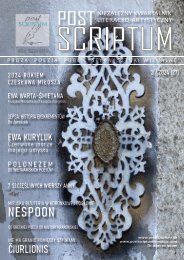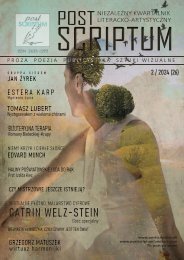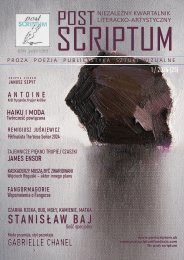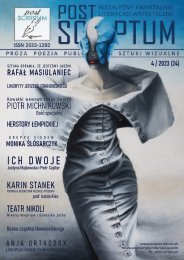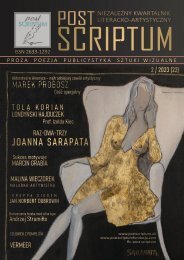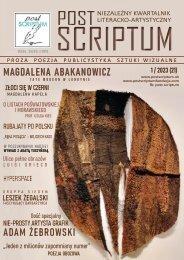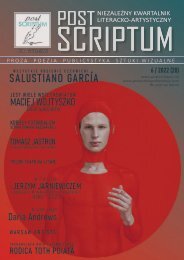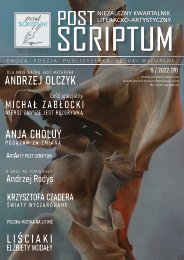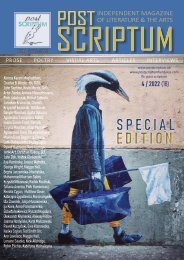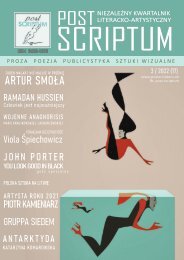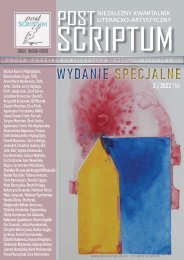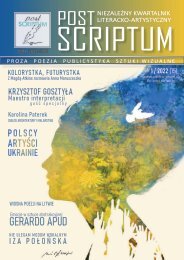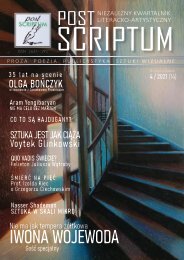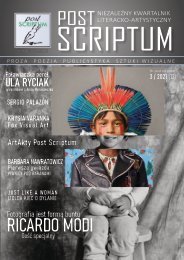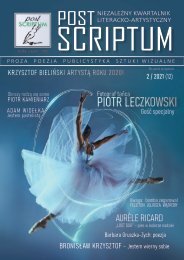POST SCRIPTUM English__ Feb 2021
POST SCRIPTUM - Independent MAGAZINE OF LITERATURE & ARTS - English version. POST SCRIPTUM - Niezależne pismo artystyczno-literackie tworzone przez polsko-brytyjski zespół entuzjastów, artystów i dziennikarzy. Zapraszamy do lektury.
POST SCRIPTUM - Independent MAGAZINE OF LITERATURE & ARTS - English version.
POST SCRIPTUM - Niezależne pismo artystyczno-literackie tworzone przez polsko-brytyjski zespół entuzjastów, artystów i dziennikarzy. Zapraszamy do lektury.
Create successful ePaper yourself
Turn your PDF publications into a flip-book with our unique Google optimized e-Paper software.
Izolda Kiec about Ginczanka<br />
Eryk Lipiński, Caricature of Zuzanna Ginczanka (owned by Izolda Kiec).<br />
<strong>POST</strong> <strong>SCRIPTUM</strong><br />
After the war, Julian Tuwim wrote<br />
to Zbigniew Mitzner: “Every day I remember<br />
those who died, every day I sigh for them,<br />
especially for my poor friend Ginczanka ...”<br />
And Gombrowicz to Piętak: “Please, tell me<br />
when and how poor Gina died. Why are you<br />
saying that she was tortured? “<br />
Jan Śpiewak, Kazimierz Wyka and Juliusz<br />
Wiktor Gomulicki started preparations for<br />
publishing selected poems by Zuzanna<br />
Ginczanka. Julian Przyboś published her last<br />
poem in Odrodzenie – which soon became<br />
evidence in the trial of Zofia Chominowa,<br />
an “informer”, accused of handing over<br />
Jews to the German police. However,<br />
the deliberations of the Szczecin Writers<br />
Convention in 1949 were not favourable<br />
for Zuzanna. She was called “Tuwim in<br />
a skirt”, a bourgeois poet, an epigone of<br />
the Scamandrites. It was decided to forget<br />
about her. And it was only in the 1990s that<br />
Zuzanna returned to our literature and the<br />
awareness of readers. All of Ginczanka’s<br />
works were published, including manuscripts<br />
saved by Eryk Lipiński, who liquidated<br />
Zuzanna’s Warsaw apartment in September<br />
1939. The poet’s monograph was published,<br />
and numerous artistic works inspired by her<br />
biography and poetry.<br />
The last traces of Zuzanna Ginczanka are<br />
her demands for food and clothing that she signed,<br />
sent from prison to the Polish Welfare Committee<br />
of Krakow-City. The last one dated April 18, 1944. There<br />
are many indications that the poet was moved in the<br />
last transport of prisoners from Krakow to the Płaszów<br />
camp and shot there on May 5, 1944.<br />
After the publication of the first<br />
selection of Ginczanka’s poetry in 1991,<br />
Wacław Oszajca said, not completing his<br />
thought: “without poetry, the life of this<br />
young girl ...” Let me finish the sentence:<br />
without poetry, the life of this young girl<br />
would not be remembered. Zuzanna<br />
Gincburg would be one of the millions,<br />
anonymous, deprived of a name, individual<br />
features or individual history, just a victim<br />
of genocide. Did she sense the drama of her<br />
own death and the power of her poetry in<br />
the beautiful yet tragic Bird’s glow, when<br />
she wrote: “and behind me, a streak of raw<br />
poems mark my trace”? [IK]<br />
80 <strong>POST</strong> <strong>SCRIPTUM</strong>




